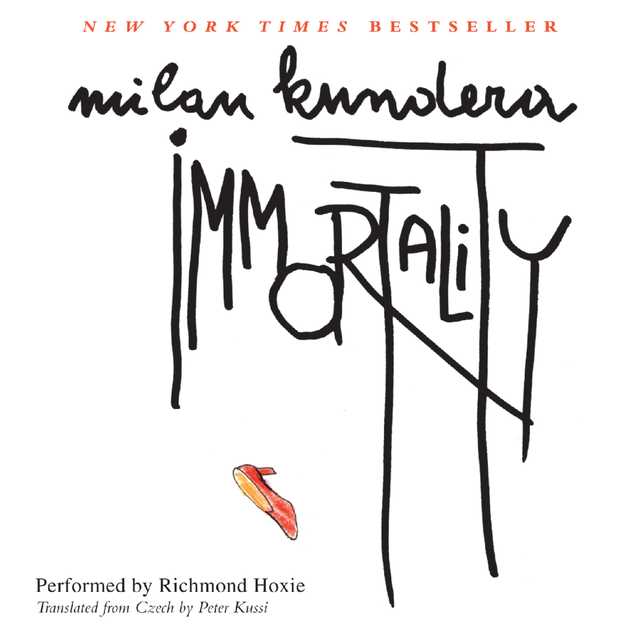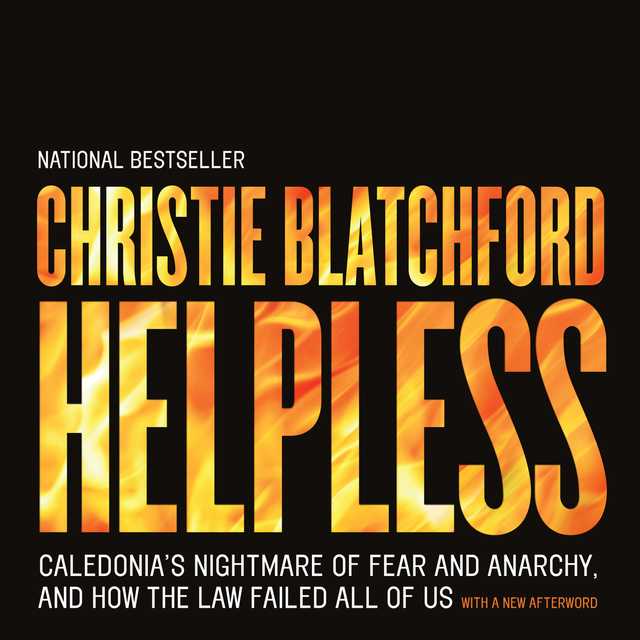Immortality Audiobook Summary
Milan Kundera’s sixth novel springs from a casual gesture of a woman to her swimming instructor, a gesture that creates a character in the mind of a writer named Kundera. Like Flaubert’s Emma or Tolstoy’s Anna, Kundera’s Agnes becomes an object of fascination, of indefinable longing. From that character springs a novel, a gesture of the imagination that both embodies and articulates Milan Kundera’s supreme mastery of the novel and its purpose; to explore thoroughly the great, themes of existence.
Other Top Audiobooks
Immortality Audiobook Narrator
Richmond Hoxie is the narrator of Immortality audiobook that was written by Milan Kundera
Milan Kundera is the author of the novels The Joke, Farewell Waltz, Life Is Elsewhere, The Book of Laughter and Forgetting, The Unbearable Lightness of Being, and Immortality, and the short-story collection Laughable Loves–all originally written in Czech. His most recent novels Slowness, Identity, and Ignorance, as well as his nonfiction works The Art of the Novel, Testaments Betrayed, The Curtain, and Encounter, were originally written in French.
About the Author(s) of Immortality
Milan Kundera is the author of Immortality
More From the Same
- Author : Milan Kundera
- The Festival of Insignificance
- The Joke
- Testaments Betrayed
- Identity
- Encounter
- Publisher : HarperAudio
- Abraham
- American Gods [TV Tie-In]
- Dead Ringer
- House of Sand and Fog
- Prey
Immortality Full Details
| Narrator | Richmond Hoxie |
| Length | 11 hours 54 minutes |
| Author | Milan Kundera |
| Category | |
| Publisher | HarperAudio |
| Release date | June 19, 2012 |
| ISBN | 9780062215543 |
Additional info
The publisher of the Immortality is HarperAudio. The imprint is HarperAudio. It is supplied by HarperAudio. The ISBN-13 is 9780062215543.
Global Availability
This book is only available in the United States.
Goodreads Reviews
Ahmad
September 10, 2021
Nesmrtelnost = Immortality, Milan KunderaImmortality is a novel in seven parts, written by Milan Kundera in 1988 in Czech. First published 1990 in French. English edition 345 p., translation by Peter Kussi. This novel springs from a casual gesture of a woman, seemingly to her swimming instructor. Immortality is the last of a trilogy that includes The Book Of Laughter And Forgetting, and The Unbearable Lightness Of Being.تاریخ نخستین خوانش: ماه آگوست سال 1994میلادیعنوان: جاودانگی، نویسنده: میلان کوندرا؛ مترجم: حشمت الله کامرانی؛ تهران، نشر فاخته، 1371؛ در 454ص؛ چاپ دوم 1372؛ چاپ دیگر تهران، نشر کانون، 1377، شابک 9649045281؛ چاپ دیگر تهران، تنویر، 1378؛ چاپ دیگر تهران، علم، 1379؛ چاپ ششم در نشر علم 1381، شابک 9644051092؛ چاپ دیگر تهران، فرهنگ نشر نو، 1391؛ در 464ص؛ شابک 9789647443579؛ موضوع: داستانهای نویسندگان چک - سده 20معنوان: جاودانگی، نویسنده: میلان کوندرا؛ مترجم: حسین کاظمی یزدی؛ مشهد، نیکو نشر، 1393، در 428ص، شابک 9789647253772؛جاودانگی رمانی اثر «میلان کوندرا»، رمان نویس «چک تبار فرانسوی» است؛ این رمان در سال 1988میلادی به زبان «چک» نوشته شد؛ و در سال 1990میلادی برای نخستین بار، و به زبان فرانسه منتشر شد؛ شخصیت اصلی داستان زنی است به نام «اگنس»، که از مشاهده ی حرکت اتفاقی زنی مسن در ذهن نویسنده ای به نام «میلان کوندرا»، پدید میآید؛ از کانال چنین شخصیتی «کوندرا» به مفهوم جاودانگی میپردازندمیلان کوندرا، در این اثر، ماجرای رابطه ی پرمشکل، و طنزآمیزِ «گوته»، و همسرش «کریستین» و برادر کوچکتر «گوته» یعنی «بتینا» را، در برابر مثلثی امروزیتر از سه شخصیت پاریسی: «پل»، همسرش «اگنس» و خواهر «اگنس»، «لارا» قرار داده است؛ «اگنس» پس از مرگ پدرش، به شکلی متفاوت با زندگی خود روبرو میشود، و درمییابد در حالیکه زندگیِ خوبی با همسرش داشته، هیچگاه شورِ عشق را در آن احساس نکرده است؛ «لارا» نیز که از همسرش جدا شده، هیچوقت عشق را، فراتر از شهوت، تجربه نکرده است؛ هم «اگنس» و هم «لارا» به «پل» علاقمند هستند و بدیهی است که کشاکش میان آنها برای به دست آوردن «پل»، تنها یک برنده خواهد داشتتاریخ بهنگام رسانی 08/08/1399هجری خورشیدی؛ 19/06/1400هجری خورشیدی؛ ا. شربیانی
Elyse
July 06, 2017
Phenomenal ........including the best first 2 pages of a book I've ever read!
Violet
June 19, 2017
On one level you could reduce this novel to the sour grapes of a man who’s getting old and losing his privileged place in the world. Not that this belittles its aspiration or wisdom because how the self changes with age, how the declining façade impacts the core, is a fascinating and rich subject. Kundera suggests the self doesn’t significantly change from within but rather is bullied out of its natural gait by the way people see us, by the images they impose on us. Even we ourselves are constrained to represent our lives with isolated images because memory, he tells us, is incapable of retaining anything but snapshots of time, isolated frames which no effort of will can restore to a detailed and continuous home movie. We are confined to the snapshots memory selects to preserve. And ultimately, in death, we become how people remember us. We become a series of snapshots, an image. At the time of writing this novel Kundera was pretty much guaranteed immortality. He’s earned his place among the immortals of literature. Understandable then that he should ponder what form this immortality will take. In one episode he has Goethe and Hemingway discuss their posthumous lives. Hemingway is unhappy that his books have become eclipsed by the innumerable biographies of his life. There’s also a fabulous section about Goethe’s relationship with a young girl called Bettina. To Goethe Bettina appears nothing but an episode. Little does he know that this largely inconsequential girl will become one of the editors of his posthumous life. "No episode is a priori condemned to remain an episode forever, for every event, no matter how trivial, conceals within itself the possibility of sooner or later becoming the cause of other events and thus changing into a story or an adventure. Episodes are like land mines. The majority of them never explode, but the most unremarkable of them may someday turn into a story that will prove fateful to you." This quote is perhaps the underlying mantra of this novel. It’s a novel of philosophical episodes which playfully mocks the conventions of the novel. "Dramatic tension is the real curse of the novel, because it transforms everything, even the most beautiful pages, even the most surprising scenes and observations merely into steps leading to the final resolution, in which the meaning of everything that preceded is concentrated." Towards the end of Immortality Milan Kundera is sitting by the same swimming pool which opens the novel with two of his characters. He is surprised these two characters know each other. Perhaps one test of a masterpiece is that it should improve on a second reading. I really enjoyed this but I didn’t quite love it as much as I did when I first read it. Some elements seemed dated, like his obsessive whining about noise pollution. Guitars and motorbikes especially cited as enemies of civilised life. We now face much worse forms of pollution and his singling out of urban noise levels made him appear a grumpy old man at times. Also some of his views on sex were those of an ageing womaniser who still can’t help seeing women almost exclusively through his libido. As his starting point Kundera shows us an elderly woman performing an alluring gesture she had used as a young girl. He finds the gesture “charming” but for him it’s only the gesture that has charm and elegance “while the body and face no longer had any charm. It was the charm of a gesture drowning in the charmlessness of the body.” This of course is the viewpoint of a sexually predatory male. Elderly women for most of us are no less capable of performing charming gestures than anyone else. Some of the most beautiful and haunting gestures I have seen have been performed by elderly people. Ironically Kundera’s posthumous life might be influenced in part by these kind of observations of his. He too, like Hemingway, might be complaining to Goethe in an afterlife that he has been misrepresented by biographies.
Jim
September 06, 2022
[Revised 9/6/22]This is a great book and I wish I had discovered it years ago, when it was translated from Czech in 1991. I liked it much more than the author's more famous book, The Unbearable Lightness of Being. A blurb says the book thoroughly explores “the great themes of existence” which is quite a task to pull off in 345 pages, but Kundera makes quite a dent in those themes. Where to start? There is a story: a couple has a daughter; the wife dies, and eventually the man marries his dead wife’s sister. That’s pretty much the plot. But as this story is told, the author compares the traits of the main characters and their attitudes toward life. For example, the first wife is serious, organized and not much fun. The younger sister is reckless, impulsive, at time suicidal, and has a series of affairs with men. The man is hard-working, reflective, and bit baffled by life. Kundera speculates on philosophical themes around this simple story. He writes about gestures as memes; solitude; bodies and faces; sex, love and lust; chance and coincidence; cameras and privacy. He gets into journalism and public opinion pools, Watergate, and what he calls imagology (kind of like symbolism). The author compares a highway that by-passes space with a road that allows you to experience the landscape. He invents a character, Professor Avenarius, who is so upset by the dominance of the automobile in cities that he randomly slashes tires as he jogs. And, of course, given the title of the book and Kundera’s prominence as an author, he speculates on legacies and how you can’t control how history will view you. At times the book has the flavor of a meta-novel. In some chapters the author talks directly to the reader and tells us about the process of writing and even refers to characters in his earlier works. In other chapters he holds imaginary conversations with folks like Goethe and Hemingway and spends a bit of time on the odd life-long relationship between Goethe and a young woman, Bettina, who may have been the world’s first self-publicist way back in the early 1800’s. Kundera points out that until recently people knew everything through their own experience: how bread is baked; how a house is built; where meat comes from, etc. He writes about categorizing people by how much time they spend thinking of the past, present or future. In summary, the great themes of existence, reflected upon by a great thinker.Photo of the author (1929 -) from dw.com
Most Popular Audiobooks
Frequently asked questions
Listening to audiobooks not only easy, it is also very convenient. You can listen to audiobooks on almost every device. From your laptop to your smart phone or even a smart speaker like Apple HomePod or even Alexa. Here’s how you can get started listening to audiobooks.
- 1. Download your favorite audiobook app such as Speechify.
- 2. Sign up for an account.
- 3. Browse the library for the best audiobooks and select the first one for free
- 4. Download the audiobook file to your device
- 5. Open the Speechify audiobook app and select the audiobook you want to listen to.
- 6. Adjust the playback speed and other settings to your preference.
- 7. Press play and enjoy!
While you can listen to the bestsellers on almost any device, and preferences may vary, generally smart phones are offer the most convenience factor. You could be working out, grocery shopping, or even watching your dog in the dog park on a Saturday morning.
However, most audiobook apps work across multiple devices so you can pick up that riveting new Stephen King book you started at the dog park, back on your laptop when you get back home.
Speechify is one of the best apps for audiobooks. The pricing structure is the most competitive in the market and the app is easy to use. It features the best sellers and award winning authors. Listen to your favorite books or discover new ones and listen to real voice actors read to you. Getting started is easy, the first book is free.
Research showcasing the brain health benefits of reading on a regular basis is wide-ranging and undeniable. However, research comparing the benefits of reading vs listening is much more sparse. According to professor of psychology and author Dr. Kristen Willeumier, though, there is good reason to believe that the reading experience provided by audiobooks offers many of the same brain benefits as reading a physical book.
Audiobooks are recordings of books that are read aloud by a professional voice actor. The recordings are typically available for purchase and download in digital formats such as MP3, WMA, or AAC. They can also be streamed from online services like Speechify, Audible, AppleBooks, or Spotify.
You simply download the app onto your smart phone, create your account, and in Speechify, you can choose your first book, from our vast library of best-sellers and classics, to read for free.
Audiobooks, like real books can add up over time. Here’s where you can listen to audiobooks for free. Speechify let’s you read your first best seller for free. Apart from that, we have a vast selection of free audiobooks that you can enjoy. Get the same rich experience no matter if the book was free or not.
It depends. Yes, there are free audiobooks and paid audiobooks. Speechify offers a blend of both!
It varies. The easiest way depends on a few things. The app and service you use, which device, and platform. Speechify is the easiest way to listen to audiobooks. Downloading the app is quick. It is not a large app and does not eat up space on your iPhone or Android device.
Listening to audiobooks on your smart phone, with Speechify, is the easiest way to listen to audiobooks.






























